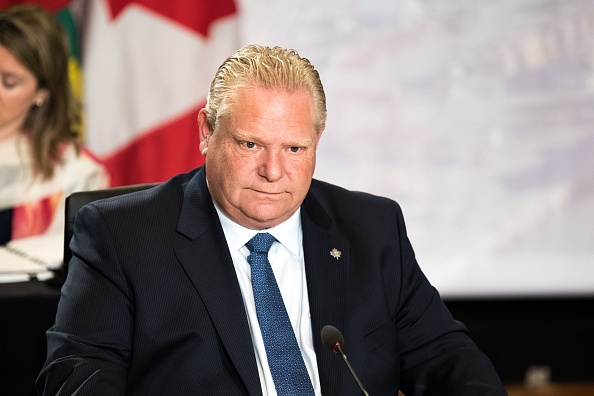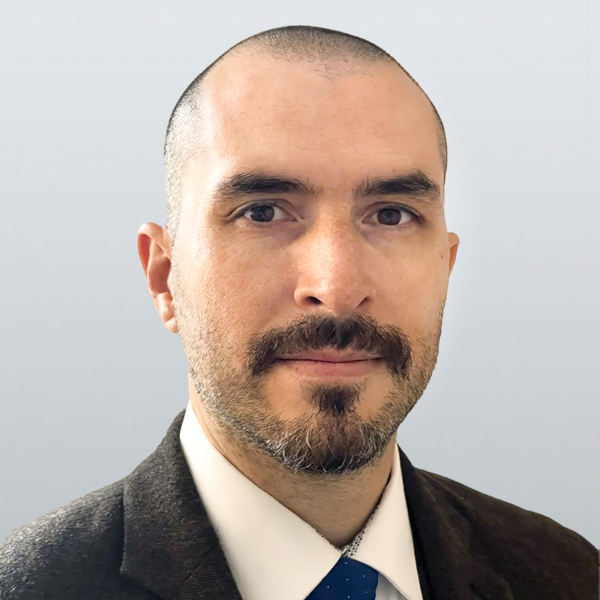
Ontario Prime Minister Doug Ford attends a meeting of the prime ministers of the Canadian provinces on December 7, 2018, in Montreal. (Photo by MARTIN OUELLET-DIOTTE/AFP via Getty Images)
Before invoking the Emergencies Act, Prime Minister Justin Trudeau had a call with the premiers of provinces and territories on Feb. 14 where several of them said getting rid of COVID-19 restrictions was the path forward and the act would “inflame” the situation, according to handwritten notes of the meeting.
While Ontario Premier Doug Ford told Trudeau and others he was very supportive of the invocation, he said he was dropping the vaccine passport.
The information was captured in the notes of Trevor Holloway, a senior intergovernmental officer with the executive council and the office of Saskatchewan Premier Scott Moe.
Holloway’s notes were entered as evidence on Nov. 10 at the Public Order Emergency Commission, which is examining the Liberal government’s invocation of the Emergencies Act last winter to deal with cross-country protests and blockades demanding the lifting of COVID-19 restrictions.
“Getting rid of vax passports etc. never liked them, but did it,” Holloway’s notes paraphrase Ford as saying. Ontario scrapped the passport on March 1.
Other premiers also chimed in on the issue of restrictions.
“PTs [provinces and territories] moved to discuss removing restrictions. Look at a plan [to] removing restrictions at the border,” Holloway’s notes paraphrase Manitoba Premier Heather Stefanson as saying.
Stefanson was against the invocation of the act.
New Brunswick Premier Blaine Higgs told call participants that his province had announced a path to re-opening.
“Not a loss for science,” he reportedly said.
“Ottawa is problem, vaccine passports for truckers becomes difficult line to hold. Talk about ‘path forward’ and Ottawa,” the notes paraphrase Higgs as saying.
Higgs was also opposed to declaring a public order emergency, saying it would inflame the situation.
Another set of notes from the meeting written by Brian Clow, Trudeau’s deputy chief of staff, said that Prince Edward Island Premier Dennis King was in favour of invoking the act, whereas Holloway’s notes do not indicate one way or another.
But Holloway’s notes indicate he also raised the issue of lifting restrictions during the call.
“Don’t want to over politicize. Find way to take sharp edges off political. 5-6 weeks vax passports and other measures reduced,” the notes paraphrase King as saying.
In a press release issued on Feb. 14 after the invocation, King said his province didn’t need the act but that he respected the “decision to provide further assistance to those provinces requiring it.”
Nova Scotia Premier Tim Houston had opposed invoking the act, but his position on restrictions isn’t clear in the notes, though it suggests he favoured lifting them.
“Same place as others[,] time to move forward and not backward,” he reportedly said.
The notes do not say whether Saskatchewan Premier Scott Moe had addressed lifting restrictions during the meeting, but he had announced his province was doing so a few days earlier.
Andrew Furey, Premier of Newfoundland and Labrador, made it clear he didn’t believe protesters were focused on getting restrictions lifted and he strongly supported the declaration of emergency.
“Don’t believe it’s about vax mandates, believe general anger against the State. Can’t placate the few. Situation can’t be tolerated any longer,” Holloway’s notes paraphrase him as saying.
Trudeau shared some of that thought and had responded to then-Alberta Premier Jason Kenney that the issue was “Not about truckers.”
“Last time we had FMM [first ministers’ meeting], I asked that you not proceed with trucker mandate. It was an unnecessary provocation. Language used went too far,” the notes report Kenney as saying.
The notes suggest Trudeau concluded the call by saying he was “sensitive to the problem of inflaming and conscious of lifting restrictions. Always been step by step. Country of rule of law.”
Ottawa started lifting restrictions much later than provinces, with its vaccine mandates for federally regulated workplaces and domestic travel lapsing in June and border rules against the unvaccinated lapsing on Oct. 1.
